Diplomatic Bluebook 2020
Chapter 4
Japan's Diplomacy Open to the Public
3 Cooperation with Local Governments
Regional revitalization is one of the priority issues of the Cabinet. MOFA actively works on the issue and strives to deploy measures that strengthen comprehensive diplomatic capabilities through collaboration with regions.
In Japan, as part of efforts to support regional revitalization, the Foreign Minister and respective prefectural governors invite members of diplomatic corps and foreign chambers of commerce and industry in Japan, and tourism-related parties to the Iikura Guest House, co-hosting receptions and setting up booths as means of broadly disseminating the various attractive qualities of regions to audiences both in Japan and abroad. In 2019, the Foreign Minister co-hosted receptions with Kagoshima (January), Ehime (February), Nagasaki (March), Miyazaki (November), and Nara (December). Every reception was successful with between 200 and 250 attendees. Along with PR for tourism, food, and traditional arts and crafts from each prefecture, Kagoshima Prefecture held an Amami dance and shamisen (Japanese stringed music instrument) performance, Ehime Prefecture held a Kumayama Gojin Daiko drum performance, Nagasaki Prefecture held a Ja-Odori Dragon Dance performance, Miyazaki Prefecture held a Takachiho-no-Yokagura dance performance, and Nara Prefecture held a Gagaku (ancient court dance and music) performance. These events provided opportunities to broadly disseminate the various attractive qualities of each region and promote further exchange and collaboration between the attendees and co-hosting local governments.
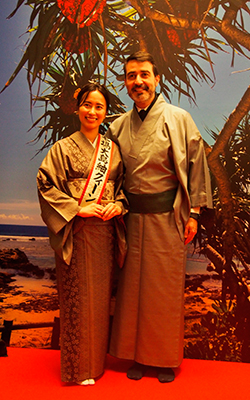 Kimono fitting experience at a reception co-hosted with the Governor of Kagoshima Prefecture (January 30, Tokyo, Iikura Guest House of the Ministry of Foreign Affairs)
Kimono fitting experience at a reception co-hosted with the Governor of Kagoshima Prefecture (January 30, Tokyo, Iikura Guest House of the Ministry of Foreign Affairs)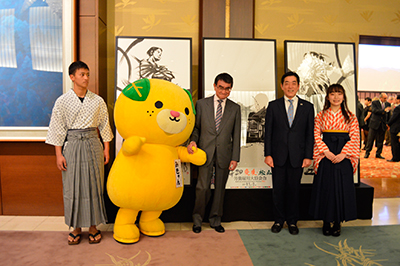 Reception co-hosted with the Governor of Ehime Prefecture (February 19, Tokyo, Iikura Guest House of the Ministry of Foreign Affairs)
Reception co-hosted with the Governor of Ehime Prefecture (February 19, Tokyo, Iikura Guest House of the Ministry of Foreign Affairs)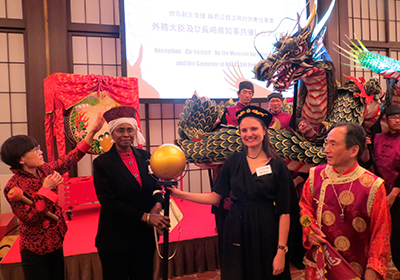 Stage performance at a reception co-hosted with the Governor of Nagasaki Prefecture (March 25, Tokyo, Iikura Guest House of the Ministry of Foreign Affairs)
Stage performance at a reception co-hosted with the Governor of Nagasaki Prefecture (March 25, Tokyo, Iikura Guest House of the Ministry of Foreign Affairs)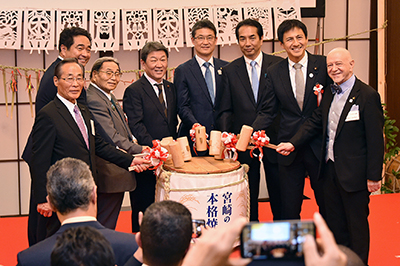 “Kagami biraki (opening a cask of Sake)” at a reception co-hosted with the Governor of Miyazaki Prefecture (November 8, Tokyo, Iikura Guest House of the Ministry of Foreign Affairs)
“Kagami biraki (opening a cask of Sake)” at a reception co-hosted with the Governor of Miyazaki Prefecture (November 8, Tokyo, Iikura Guest House of the Ministry of Foreign Affairs)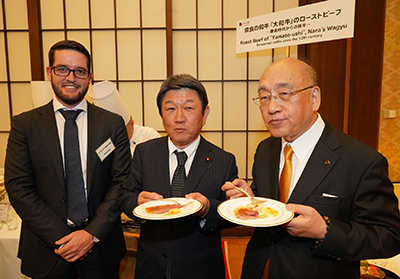 Yamato-ushi beef (specialty product from Nara Prefecture) booth at a reception co-hosted with the Governor of Nara Prefecture (December 11, Tokyo, Iikura Guest House of the Ministry of Foreign Affairs)
Yamato-ushi beef (specialty product from Nara Prefecture) booth at a reception co-hosted with the Governor of Nara Prefecture (December 11, Tokyo, Iikura Guest House of the Ministry of Foreign Affairs)In addition, MOFA cooperated with multiple local governments to host Regional Promotion Seminars in Tokyo. Conducted for members of diplomatic corps in Japan, chambers of commerce and industry, tourism-related companies, and other organizations, these seminars highlight the characteristics, advantages, and attraction of regions in Japan for industry, tourism, investment, and business promotion. Chichibu City (Saitama Prefecture), Sakai City (Osaka Prefecture), Kyotango City (Kyoto Prefecture), and Tateyama Town (Toyama Prefecture) participated in seminars in June. Through presentations, representatives talked about the attractiveness of their regions, promoted local specialties and tourism at receptions with attendees, and showcased traditional performing arts through actual performances. The events were well received by the diplomatic corps and other organizations in attendance for being valuable opportunities to directly experience the attractiveness of regional Japan while being in Tokyo. The seminars also promoted networking among local governments and diplomatic corps and other foreign organization members.
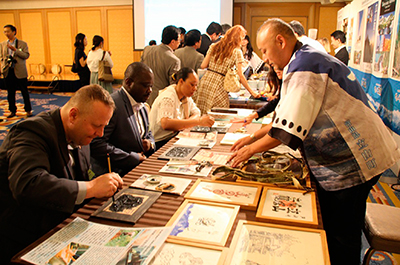 Regional Promotion Seminar: Production experience using washi paper and sumi ink from Tateyama Town, Toyama Prefecture at a networking session (June 4, Tokyo)
Regional Promotion Seminar: Production experience using washi paper and sumi ink from Tateyama Town, Toyama Prefecture at a networking session (June 4, Tokyo)“Diplomats' Study Tours,” co-organized by MOFA and local governments and other organizations for the diplomatic corps in Japan, were conducted in Fukushima Prefecture in January, Ibaraki Prefecture in February, Iizuka City (Fukuoka Prefecture) in April, Chiba City (Chiba Prefecture) in July, Hagi City (Yamaguchi Prefecture) in September, and Kagoshima Prefecture in November, with visits made by a total of about 130 members of more than 110 diplomatic corps. The diplomatic corps, including ambassadors, visited places of scenic beauty in each region as well as cultural and industrial facilities in the community, which enabled them to experience the many community attractions of each region. As for the tour to Fukushima, it was an opportunity to deepen understanding of reconstruction efforts over the approximately eight years since the 2011 Great East Japan Earthquake. After the tours, some local governments started exchanges and collaboration with participating countries while others aimed to increase the number of visitors to such communities by utilizing connections with participating diplomatic corps.
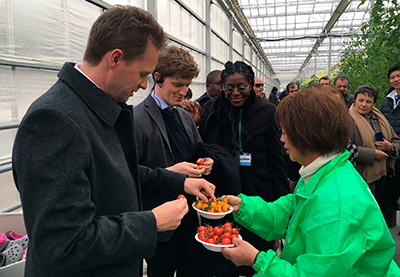 Diplomats' Study Tour: Tasting fresh cherry tomatoes at Wonder Farm (January 15-16, Fukushima Prefecture)
Diplomats' Study Tour: Tasting fresh cherry tomatoes at Wonder Farm (January 15-16, Fukushima Prefecture)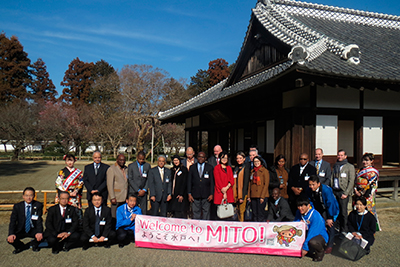 Diplomats' Study Tour: Visit to Kodokan (February 22, Ibaraki Prefecture)
Diplomats' Study Tour: Visit to Kodokan (February 22, Ibaraki Prefecture)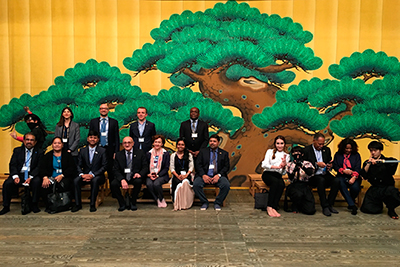 Diplomats' Study Tour: Visit to Kaho Theater (April 22-23, Iizuka City, Fukuoka Prefecture)
Diplomats' Study Tour: Visit to Kaho Theater (April 22-23, Iizuka City, Fukuoka Prefecture)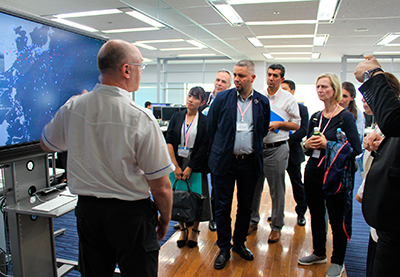 Diplomats' Study Tour: Visit to Weather News (July 10, Chiba City, Chiba Prefecture)
Diplomats' Study Tour: Visit to Weather News (July 10, Chiba City, Chiba Prefecture)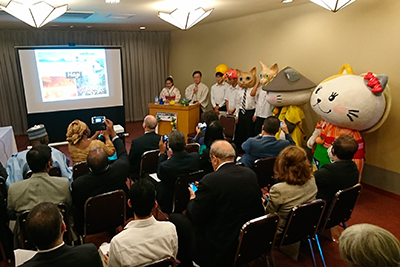 Diplomats' Study Tour: Presentation by Hagi City Mayor (September 26-27, Hagi City, Yamaguchi Prefecture)
Diplomats' Study Tour: Presentation by Hagi City Mayor (September 26-27, Hagi City, Yamaguchi Prefecture)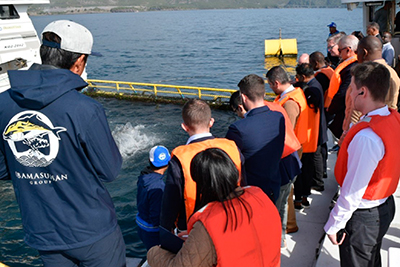 Diplomats' Study Tour: Inspection visit to an amberjack farm (November 14-15, Kagoshima Prefecture)
Diplomats' Study Tour: Inspection visit to an amberjack farm (November 14-15, Kagoshima Prefecture)Furthermore, MOFA actively provides local governments with opportunities to learn Japan's current diplomatic policies and exchange views. As a part of such activities, MOFA held the “Local Partnership Cooperation Forum” in January. Part one of the forum was the foreign policy briefing session, which consisted of a presentation titled “Towards the Seventh Tokyo International Conference on African Development (TICAD7): New Frontiers in Business and International Exchanges)” by MOFA and an “Explanation of Efforts to Promote Host Towns.” In Part two of the forum, which featured sectional meetings, participants exchanged views on themes entitled “Outbound Communications Using Foreign Press and Social Media: From Rural Areas to the World,” “Invigorating Regions via Foreign Tourists: Gastronomy Tourism,” “SDG Initiatives Towards Globalization,” and “Communicating the Charms of Regional Traditional Performing Arts and Crafts: Various Communication Methods.” At a discussion session held afterwards, diplomatic corps members had a lively discussion with members of local governments.
Overseas, MOFA continued to conduct the comprehensive PR program called “Project to Support Overseas Presentations to Promote the Attractiveness of Regions” for sharing the attractiveness of regions, promoting exports of prefectural products, and supporting tourism for regional revitalization together with efforts to eliminate and ease import and travel restrictions as a way to dispel reputational damage stemming from the Great East Japan Earthquake. This project was held in Beijing and Shanghai in January, in Moscow in March, and in Beijing and other parts of China from November to December.
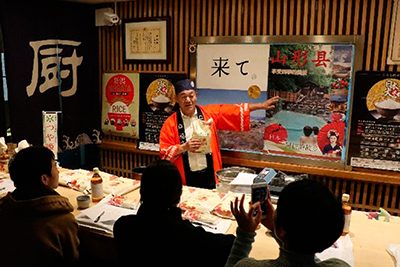 Project to Support Overseas Presentations to Promote the Attractiveness of Regions: Japanese Rice Fair at Japanese Restaurants (January, Beijing and Shanghai, China)
Project to Support Overseas Presentations to Promote the Attractiveness of Regions: Japanese Rice Fair at Japanese Restaurants (January, Beijing and Shanghai, China)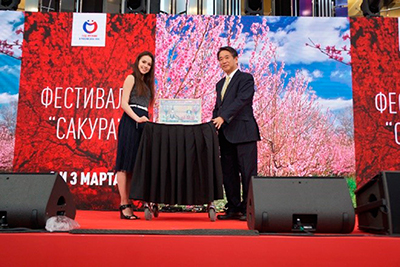 Project to Support Overseas Presentations to Promote the Attractiveness of Regions: Special ceremony (March, Moscow, Russia)
Project to Support Overseas Presentations to Promote the Attractiveness of Regions: Special ceremony (March, Moscow, Russia)A total of 15 local governments from Japan participated in the Beijing and Shanghai event, which served as a platform for promoting the attractiveness of made-in-Japan products, such as Japanese rice, through various events, such as food sampling sessions and Japanese rice tasting, which were held at Japanese restaurants, etc. In addition, the March event in Moscow held a “Sakura×Matsuri” PR event with the purpose of promoting understanding and increasing consumption of attractive regional products and tourism resources, and approximately 20,000 people visited over two days. 15 local governments from Japan exhibited at the event, introduced specialty products, and demonstrated representative performances from each region. The November to December events in various parts of China included PR and sales promotion events for made-in-Japan products sponsored by retail stores, e-commerce, and Japanese restaurants, as well as Japanese food fairs as “cooperative projects,” and 11 local governments from Japan participated jointly with partner companies.
In addition, “Regional Promotion Projects” were conducted 10 times in Asia, North America, and Europe as measures to support local governments in promoting the development of local industries and regional economies through the attractiveness of each region by making use of Japan's diplomatic facilities overseas.
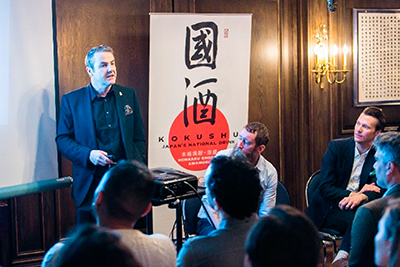 Regional Promotion Project: Seminar on introducing shochu and awamori at the residence of the Consulate General of Japan in New York (February 11, New York, U.S.)
Regional Promotion Project: Seminar on introducing shochu and awamori at the residence of the Consulate General of Japan in New York (February 11, New York, U.S.)Furthermore, MOFA supports exchanges between local Japanese governments and abroad through various initiatives such as sister-city exchanges between Japanese local bodies and their counterparts abroad and host-town exchanges for the Olympic and Paralympic Games Tokyo 2020. Specifically, in order to support international activities of local governments and communities, Japanese diplomats visit sister cities of Japanese municipalities and share opinions with officials responsible for international and economic exchanges. Heads of the diplomatic missions overseas also visit local municipalities in Japan to have dialogues on sister city and host town exchanges or deliver lectures prior to leaving for new posts or when they temporarily return to Japan. In addition, if a foreign local governmental body wants to establish a sister-city relationship with a Japanese one, MOFA indirectly supports such a move by providing prefectures and 20 government-designated cities with relevant information and posting it on the “‘Glocal' (global and local) Diplomatic Network” on MOFA's website4 (see the Column on page 334).
As part of the overseas promotion of alcoholic beverages (Japanese sake, wine, shochu, awamori, etc.) produced in various parts of Japan, diplomatic missions overseas actively promote them, through carrying out proactive PR activities to showcase Japanese alcoholic beverages, by offering them at lunch and dinner with government leaders of the assigned countries or diplomatic corps of other countries and making a toast with Japanese sake at grand events such as the receptions for celebrating the birthday of His Majesty the Emperor (see the Special Feature on page 284).
MOFA is also working to respond to the quickly growing demand for water treatment, waste disposal, urban transportation, and anti-pollution measures as a result of rapid economic development in developing countries. These measures involve making use of ODA and leveraging Japanese local governments' experience and expertise, as well as conducting development cooperation using outstanding technologies and products from the local SMEs that support these regions. Through these efforts, MOFA provides support for matching these countries' development needs with companies' products and technologies. These efforts not only contribute to the global outreach of local companies, the development of globally competent human resources, and the Japanese style of infrastructure exports, but also to vitalizing the entire Japanese economy and the economies of some local areas.
- 4 As of December 2019, the countries with the largest number of sister affiliations (including prefectures and municipalities) with Japan in descending order are the U.S. (455), China (370), the Republic of Korea (163), Australia (108) and Canada (71) (Aggregated by the Council of Local Authorities for International Relations. See CLAIR's website: http://www.clair.or.jp/e/exchange/shimai/countries/)

OMOTENASHI
-Japanese Way of Hospitality-

In 2013, the word “Omotenashi” raised the expectations of people around the world during Japan's bid to host the Olympic and Paralympic Games. The memory probably remains fresh in the minds of many people. In September 2019, baseball players from Nicaragua, who had been stuck at Narita International Airport due to a typhoon on their way back from a match held in Korea, were welcomed warmly by the Host Town, Kanra Town in Gunma Prefecture. This was an event that truly embodied the “Omotenashi” (Japanese way of hospitality) spirit of the Host Towns.
Many people may perceive the Host Towns as official camp sites, but the Host Town Initiative for the Olympic and Paralympic Games Tokyo 2020 is a unique one. Japanese local towns that wish to register as Host Towns are required to facilitate exchanges with athletes participating in the Games, exchanges with the citizens of countries and regions participating in the Games, and exchanges with Japanese Olympians and Paralympians. Even the Japanese local towns that do not serve as the pre-Games training camp sites for athletes can become Host Towns and deepen exchanges from their position as supporters who cheer on participating countries and regions. This initiative of exchanges facilitated by the Host Towns in the Olympic and Paralympic Games Tokyo 2020 was clearly set out as the Host Town Initiative in the Olympic Truce Resolution,* adopted unanimously at the UN General Assembly in December 2019.
492 Japanese local towns engage in activities as Host Towns (169 partner countries and regions as of March 31, 2020). There are many varied factors that have brought about the Host Towns relations. Some of them know each other well through sister city exchanges carried out to date, and others became acquainted for the first time through this initiative. There are also some Japanese local towns that wish to show their recovery to the countries and regions that supported reconstruction in the aftermath of the Great East Japan Earthquake. Among these, there is even a case where a connection was made through the sound of the place names “Haiti” (pronounced as “Aichi” in French, which is the official language of Haiti) and “Aichi Prefecture” (Kota Town).
Various exchange activities are carried out by athletes and citizens of the partner countries and regions by visiting Japan, including the introduction of traditional performing arts and food culture that the region is proud of, and the deepening of exchanges among elementary, junior high school, and high school students.
Some Host Towns take advantage of the exchanges with Paralympians from the world to develop initiatives aimed at realizing an inclusive society in the region. Others actively promote exchanges with a view to a future with more foreign nationals in the regional society, so that the children, who will play vital roles in the future, can adapt to a multicultural society with a mindset open to the world.
“Participating in the Host Town Initiative has enhanced my communication skills. I want to learn the language of the partner country so that I can convey the charms of my hometown and Japanese culture.”
“It is possible to interact with others through feelings, even if we do not understand the other's language. Respect and understanding for each other can overcome barriers.”
This is some of the reassuring feedback received from the students and children who are proactively involved in the Host Town exchanges.
Such exchanges can be expected to revitalize the regions and strengthen relationships with the partner countries and regions, thereby becoming legacies for the future.
Many of the Host Towns in Japan are already warmly welcoming foreign athletes and citizens with a spirit of “Omotenashi,” and implementing a wide range of activities.
One Ambassador to Japan said that he was moved to see so many supporters cheering on athletes from his country to make them do their best at the Olympic and Paralympic Games Tokyo 2020.
It is our earnest hope that the spirit of the Host Town Initiative continues for many years to come, even beyond the Tokyo 2020 Games.
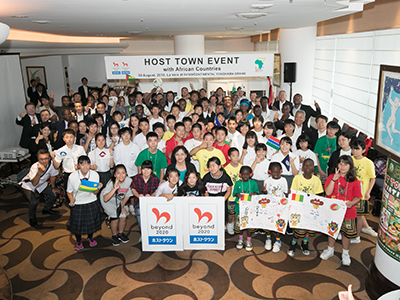 At a side event of the 7th Tokyo International Conference on African Development (TICAD7), Japanese children from the Host Towns of African countries sent warm messages to their partner countries (August 30, Yokohama; Photo: Cabinet Secretariat)
At a side event of the 7th Tokyo International Conference on African Development (TICAD7), Japanese children from the Host Towns of African countries sent warm messages to their partner countries (August 30, Yokohama; Photo: Cabinet Secretariat)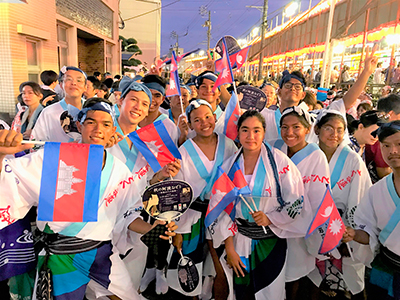 Cambodian swimmer participating in the Awa Odori Festival (August 12; Photo: Tokushima Prefecture)
Cambodian swimmer participating in the Awa Odori Festival (August 12; Photo: Tokushima Prefecture)- *The Olympic Truce Resolution: This UN General Assembly Resolution has been continuously adopted since the 1994 Winter Olympics in Lillehammer, calling for a worldwide truce during the period from seven days before the start of the Olympic Games to seven days after the Paralympic Games. The Truce Resolution submitted by Japan to the UN General Assembly in December 2019 includes sections unique to the Tokyo 2020 Olympic and Paralympic Games, such as the concept of the Games, contribution to peace, and the Host Town Initiative.

